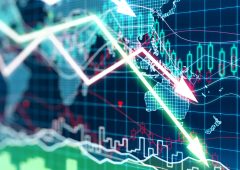U.S. Unemployment Rises and Major Banks Predict Significant Interest Rate Cuts
14.08.2024 9:30 1 min. read Alexander Stefanov
The U.S. economy is showing signs of strain as unemployment climbed from 4.1% to 4.3% in July, increasing the number of jobless Americans to around 7.2 million.
This labor market decline coincides with a massive $6.4 trillion drop in global stock markets over a three-week period.
Wells Fargo analysts are sounding alarms, urging the Federal Open Market Committee (FOMC) to shift to a ‘neutral’ policy stance to avoid worsening the economic downturn. In response, major banks are predicting significant interest rate cuts.
Bank of America anticipates a rate cut in September, while Wells Fargo and JPMorgan Chase foresee a 50 basis point reduction in both September and November. Citi expects a cumulative 100 basis point cut by November, aiming for a range of 3% to 3.25% by mid-2025.
These anticipated rate adjustments reflect growing concerns about the economic stability in the U.S. and globally, suggesting that investors should prepare for potential financial instability in the near future.
-
1
Billionaire Slams Meme Stock Hype and Sounds Alarm on U.S. Fiscal Health
15.06.2025 18:00 2 min. read -
2
Robert Kiyosaki Predicts 2025 “Super-Crash,” Urges Hoarding Gold, Silver, and Bitcoin
23.06.2025 13:31 2 min. read -
3
Billionaire Investor Sees Dollar Crash If Key Support Breaks
18.06.2025 15:00 1 min. read -
4
Nassim Taleb Says Global Trust Is Shifting from the Dollar to Gold
22.06.2025 17:00 1 min. read -
5
U.S. Recession May Already Be Locked In, Economist Warns
23.06.2025 12:00 1 min. read
Robert Kiyosaki Predicts When The Price of Silver Will Explode
Robert Kiyosaki, author of Rich Dad Poor Dad, has issued a bold prediction on silver, calling it the “best asymmetric buy” currently available.
U.S. PCE Inflation Rises for First Time Since February, Fed Rate Cut Likely Delayed
Fresh data on Personal Consumption Expenditures (PCE) — the Federal Reserve’s preferred inflation gauge — shows inflation ticked higher in May, potentially delaying the long-awaited Fed rate cut into September or later.
Trump Targets Powell as Fed Holds Rates: Who Could Replace Him?
Federal Reserve Chair Jerome Powell is once again under fire, this time facing renewed criticism from Donald Trump over the Fed’s decision to hold interest rates steady in June.
U.S. National Debt Surge Could Trigger a Major Crisis, Says Ray Dalio
Billionaire investor Ray Dalio has sounded the alarm over America’s soaring national debt, warning of a looming economic crisis if no action is taken.
-
1
Billionaire Slams Meme Stock Hype and Sounds Alarm on U.S. Fiscal Health
15.06.2025 18:00 2 min. read -
2
Robert Kiyosaki Predicts 2025 “Super-Crash,” Urges Hoarding Gold, Silver, and Bitcoin
23.06.2025 13:31 2 min. read -
3
Billionaire Investor Sees Dollar Crash If Key Support Breaks
18.06.2025 15:00 1 min. read -
4
Nassim Taleb Says Global Trust Is Shifting from the Dollar to Gold
22.06.2025 17:00 1 min. read -
5
U.S. Recession May Already Be Locked In, Economist Warns
23.06.2025 12:00 1 min. read


